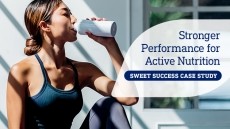Sucralose safety ‘scientifically sound’: Expert panel
Last year scientists from Duke University reported that consumption of the sweetener Splenda at doses within the US FDA’s Acceptable Daily Intake may suppress beneficial bacteria in the gut, and cause weight gain.
Professor Abou-Donia and his co-workers reported in the peer-reviewed Journal of Toxicology and Environmental Health, Part A that significant reductions in the levels of so-called beneficial bacteria were observed following a feeding study with rats.
McNeil Nutritionals, the company behind Splenda, was quick to dismiss the study and draw attention to a number of other studies supporting the safety of the sweetener. The company questioned the methodology and the conclusions drawn by the researchers. Emphasis was also placed on the involvement of the Sugar Association as partial sponsor of the study.
An expert panel, including scientists from Rutgers University, New York Medical College, Harvard School of Public Health, Columbia University, and Duke University, now appears to agree with McNeil’s statements.
Writing in Regulatory Toxicology and Pharmacology, the panel reports that Prof Abou-Donia’s study was “not scientifically rigorous and is deficient in several critical areas that preclude reliable interpretation of the study results with regard to the effects of either sucralose or Splenda in rats or humans”.
The panel, led by independent consultant David Brusick, re-evaluated the Duke University rat study, including a consideration of study design and conduct, and the outcomes.
According to their findings Prof Abou-Donia’s study was “deficient in several critical areas and that its results cannot be interpreted as evidence that either Splenda, or sucralose, produced adverse effects in male rats, including effects on gastrointestinal microflora, body weight, CYP450 and P-gp activity, and nutrient and drug absorption”.
The need for a re-evaluation
The expert panel was convened “because the general public continues to be concerned about the safety of food ingredients, including non-nutritive and nutritive sweeteners, it is important that all safety data regarding food ingredients be made publicly available, and the data should be critically evaluated to assure the public that the conclusions presented are supported by data from properly designed and executed studies,” said the article.
“The extensive safety data of sucralose and maltodextrin have been rigorously evaluated by experts around the world, and the available evidence demonstrates that Splenda, sucralose, and maltodextrin are safe for their intended uses.”
McNeil’s addition
In the same issue of Regulatory Toxicology and Pharmacology Lee Grotz from McNeil Nutritionals and Ian Munro from Cantox Health Sciences International authored a safety assessment for sucralose. They conclude: “Trained safety and health protection experts from around the world conclude from this database that sucralose is a safe food ingredient that can be safely consumed for a lifetime.
“FDA has specifically noted that it has found sucralose safe for use by children, and people with diabetes, and has found it to be safe for use in foods, generally.
“Both sucralose and the retail product, Splenda No Calorie Sweetener, can be safely used and may be a useful adjunct to the diet in meal plans designed to reduce unwanted calories or carbohydrate from nutritive sweeteners.”
Sucralose is reportedly used as an ingredient in over 4,000 products worldwide, according to Tate & Lyle.
Source: Regulatory Toxicology and Pharmacology
October 2009, Volume 55, Issue 1, Pages 6-12
“Expert Panel report on a study of Splenda in male rats”
Authors: D. Brusick, J.F. Borzelleca, M. Gallo, G. Williams, J. Kille, A.W. Hayes, F.X. Pi-Sunyer, C. Williams, W. Burks
Regulatory Toxicology and Pharmacology
October 2009, Volume 55, Issue 1, Pages 1-5
“An overview of the safety of sucralose”
Authors: V.L. Grotz, I.C. Munro




















